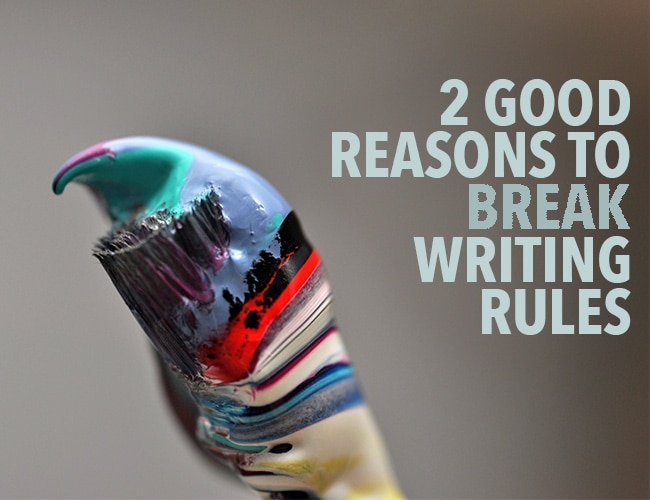I have a friend who is both a writer and a visual artist. One day she entered a painting contest and won third place! All of the award-winning entries were put on display. And then, during the exhibition, she overheard some people talking about her piece, unaware that she was the artist.
They said she hadn’t followed all the rules.

I forgot exactly what she did, but they were right. She had either used the wrong sized canvas or certain materials that weren’t allowed. It was a clear violation. Nevertheless, she won an award.
Some people may read this story and register unfairness. After all, everyone else who entered the contest presumably followed the rules.
But I view it differently.
I see a woman who stayed true to her vision and took a risk by submitting her work anyway. Sure, it’s possible she got dinged and otherwise could have won first place. Or maybe the only reason she was able to move the judges at all was that she liberated herself from the rules.
Either way, it go me thinking and I’ve decided that there are at least two good reasons to break writing rules.
2 Good Reasons to Break Writing Rules
Not yet convinced? Take a look at these two reasons to break the rules:
1. Break the Rules to Liberate Your Creativity
My friend, the visual artist, confirmed to me that she violated the contest’s rules on purpose. She did it because making the illegal alteration was the only way she could tell the story she wanted through her art.
Writing rules are useful, even vital guides. But they shouldn’t hinder our greatness. If you have a vision and the only way to turn it into reality is by throwing in a cliché or splitting an infinitive, I say go for it. Then workshop your piece (by allowing it to be critiqued by others) to figure out if it works or not.
2. Break the Rules to Challenge the Status Quo
Rules are great, but sometimes they need to be challenged because they are outdated or exclusive.
For example, you may have been taught that your character’s dialogue must be consistent throughout your story. Your protagonist shouldn’t use slang and have grammatical errors one day and then speak with perfect diction the next day, right?
But what if the person who taught you that rule never heard of or engaged in “code switching”? “Code switching” (according to dictionary.com) is “the modifying of one’s behavior, appearance, etc. to adapt to different sociocultural norms,” and it’s pretty common among minority communities. Breaking the rules, then, could actually make your character more authentic.
I believe there are lots of examples of rules that don’t make sense for every person or every situation because they weren’t written with everyone in mind. Sometimes it will be up to you to notice that and be the one to challenge the status quo.
Break the Rules Deliberately
To be clear, I believe in writing rules and conventions. I think it’s great to be taught certain standards and be held accountable to them.
But we shouldn’t be so concerned about various writing rules that they hinder our creativity, authenticity, or otherwise make us feel trapped.
When we break the rules it should be deliberate and for a good reason.
Have you ever deliberately broken a writing rule? Which one, and why? Let us know in the comments.
PRACTICE
Here at The Write Practice, we like to take ideas to their extremes. What writing rules do you work hard to abide by? Pick one (or more!). Then, for fifteen minutes, write a story in which you break that rule as much as you can.
Not sure which writing rule to break? Try one of these: avoid clichés; never split infinitives; use only “said”; avoid adverbs; show, don’t tell; don’t use the passive voice; show us who your character is through their choices.
When you’re done, share your writing practice in the comments, and be sure to leave feedback for your fellow writers! Can you tell which writing rules they’re breaking?
The post 2 Good Reasons to Break Writing Rules appeared first on The Write Practice.
from The Write Practice http://ift.tt/2Eicuze
No comments:
Post a Comment